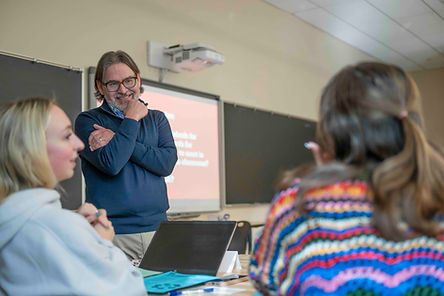Explore My Courses

Over the last fifteen years, I have developed and taught a wide variety of classes for undergraduate, graduate and doctoral level students. Whether I'm teaching an online class or a face-to-face one, I believe students learn best by actively engaging with their peers through content-related discussions. I also design my classes so that even though most theoretical concepts have practical applications.
EDFN 320/520: Instructional Technology in Elementary Education
In this class, students use case studies to explore the uses of technology and its application in elementary education. Students are provided a series of hands-on experiences with instructional technology to develop the skills and competencies required of the elementary education teacher.
EDSE 330/530: Instructional Technology, Design and Assessment
In this course, instructional design and assessment is used as a basis for planning and evaluating the use of technology for student-centered teaching and learning within specific disciplines.
ACTE 550: Foundations of Artificial Intelligence in Education
This course provides an in-depth exploration of generative artificial intelligence and AI literacy, equipping educators with the knowledge and skills to use AI effectively to support their work and learning.
ACTE 552: Ethical and Responsible Use of Artificial Intelligence in Education
This course explores the ethical and responsible use of artificial intelligence (AI) in educational settings. Participants will examine AI-powered educational tools, analyzing their terms of service, data usage policies, and alignment with legal and ethical standards.
ACTE 630: Current Technology for Online Instruction
In this course, students will develop skills in using current and emerging instructional technology to support online learning environments. Instructional design and assessment as well as national standards are used as a basis for planning and evaluating student-centered distance education. The methodologies and technologies used in the course are updated each semester according to current trends, practices, and research in the field of instructional technology.
ACTE 632: Online Learning Environments
Students examine methods of engaging students in online learning environments and ways to effectively foster communication and interaction between students, content, and the instructor. Current research studies will be used to inform the creation of online learning environments that support and assess student learning. Students will complete an online field experience in a K- 12 online environment.
ACTE 635: Instructional and Curricular Design for Online Teaching
This course is designed as an integrative project-based experience for students. The course applies instructional design methodology to the development of online courses that are engaging and effective, and in alignment with standards and best practice as identified by learning research. Course participants will create a fully developed online course customized for use in a targeted instructional setting. Participants will enact a unit of instruction as either the lead teacher or as an intern co-teaching role.
ACTE 699: Inquiry for Teaching & Learning
This course examines the design, execution, and communication of applied research in emerging fields of online teaching or STEM education. In this applied research course, candidates demonstrate the use of emerging technologies, effective instructional design, and use of assessment data for improving curricular design
ELPP 828: Emergent Technologies and Instructional Practices
Designed to provide future school and district administrators with the requisite skill sets and conceptual knowledge needed for effective 21st-century leadership. Understanding technology as a tool for learning, managing, analyzing, communicating, and collaborating is integral to successful school leadership at the classroom, building, and central office levels. Topics explored include technology integration, digital citizenship, use of technology in systematic organizational improvement, professional growth, digital culture, and visionary leadership. In addition to developing personal philosophies regardingthe use of technology in teaching, learning, and leading, each student will develop a personal portfolio of resources.